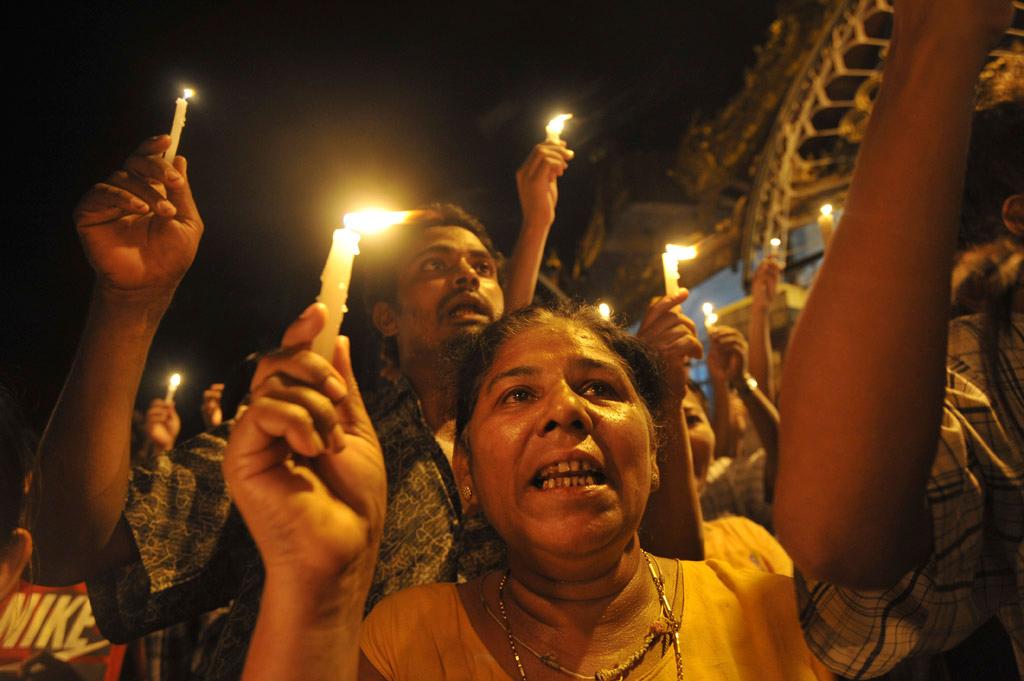What can we say about protests in Myanmar?
Demonstrators in Myanmar protest against severe power cuts at Sule pagoda in Yangon, May 22, 2012.
As of Tuesday, street protests against power cuts in Myanmar had spread to Yangon, the country's largest city.
They were small, attracting only around 50 people, and paled in comparison to the demonstrations that took place the two days prior in Mandalay — which attracted as many as 1,500 people, according to news reports.
But they are evidence that the movement is gaining momentum, and the world is taking note.
These are the largest protests since the 2007 Saffron Revolution, which was brutally clobbered by the ruling junta, and they are certainly among the most noteworthy acts of dissent since the recent rolling out of reforms — which have culminated in dissident rock star Aung San Suu Kyi holding office and a loosening of sanctions against the once-isolated regime.
So, what can we say about these protests?
Power cuts are a huge issue in Myanmar, just as they are in other developing parts of Asia and the world. Hundreds of businesses are forced to use their own diesel generators, which are expensive, not to mention the fact that the majority of the population doesn't have access in the first place.
More from GlobalPost: Burma Rebooted
But that's been true for decades. The difference now, of course, is that people in Myanmar are able to take to the streets with relative abandon and speak their minds about it. The new government recently said that public demonstrations are allowed, so long as authorities are given five days notice.
According to The Irrawaddy, the weekend protests in Mandalay did not fulfill this requirement, which carries with it a penalty of one-year imprisonment for failure to comply. Around 40 protesters were detained, and then they were then let go.
In this way, the protests are an important test of how the government is going to handle the vocal opposition at this stage.
According to the AP, the government made an uncharacteristic plea for understanding (literally called "Plea to the Public") early on Tuesday, asking that folks try to tolerate the fact that there is simply less electricity in the summer months and not much they can do about it at this juncture.
“The government has invited domestic and foreign companies to invest in Myanmar electric power production,” the ministry’s statement said. “Please understand that electricity rationing had to be introduced,” the statement added, asking for “the people to cooperate by sparingly using electricity.”
Of course, by highlighting the energy shortage, the government also throws up a red flag for potential future investors. If the infrastructure really is that dismal …
But the government didn't respond brutally (save a jab in their statement, blaming part of the shortage on Kachin rebels who blew up transmission towers), and in a country that was so closed for so long, it's hard not to look for an ounce of hope in these protests.
GlobalPost's breaking news editor, Hanna Ingber, who just returned from a trip to Myanmar and is penning a book about her experiences there over the years (stay tuned!), said she was struck by how real the changes feel. People were genuinely hopeful in Yangon, she said, which contrasts with the views of many more cynical analysts who say it's too soon to know whether reforms mean lasting change.
The irony of the freedom to protest is that, as valuable as it is, it only serves to expose deeper societal ills unless it is accompanied by corresponding freedoms. The reasons that compel people to take to the street remain.
As one Yangon protester, Cho Cho, told the AP: “We have no electricity sometimes for two days. Even getting drinking water is absolutely difficult. We are staging a peaceful protest to demonstrate our unhappiness with the shortages in this country.”
It's hard not to think of China, and the tradition of peasant revolt that continues today despite a culture of oppression that by all accounts is getting worse.
Our coverage reaches millions each week, but only a small fraction of listeners contribute to sustain our program. We still need 224 more people to donate $100 or $10/monthly to unlock our $67,000 match. Will you help us get there today?
